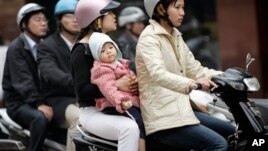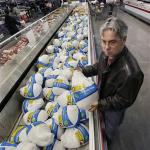30 September, 2015
Vietnam is developing quickly with skyscrapers and supermarkets. But the country still lacks one kind of public transportation that many countries of the world have: a subway system.
After many years of delays and debates, Vietnam now seems committed to a subway. Construction on the underground train systems is taking place in Hanoi in the north, and Ho Chi Minh City in the south.
Vu Thi Hang Hanh is deputy head of the architecture department at Ho Chi Minh City University of Architecture. She says, "Because we are a developing country, we want to achieve what we think the developing world should have."
Ms. Hanh is a consultant for the city government. She works on urban design around the subway stations. She says Vietnamese consider it a high-technology sign of progress. The Southeast Asian nation reached middle-income status in 2009. Per capita yearly income, a common measure of a nations earning power, is now almost equal to $2,000.

People ride motorbikes in Hanoi. Urban planners hope a new subways system will reduce congestion, improve safety and cut pollution.
Will motorbike riders use a subway system?
Vietnam's commuters are known for their dependence on motorbikes. They make up 80 percent of vehicles in Ho Chi Minh City. However, a recent university conference was asked to find out if that could be changed.
Motorbikes are popular because they are cleaner and cheaper than cars, and they take up less space. People can easily do many tasks quickly, like getting groceries in the market or a phone card from a street vendor.
People who support subways argue that planners should offer parking to combine private and public transportation.
Some estimates say public transportation moves only 10 percent of commuters in Ho Chi Minh City. That could change with a subway. The project is receiving money from governments and other investors in Japan, Germany, Spain and the Asian Development Bank.
Transportation officials hope that a subway system will reduce congestion, pollution and traffic deaths. The World Health Organization says "road traffic injuries are the leading cause of death for those aged 15 to 29." It is estimated that there are 30 million motorbikes on Vietnam's roads.
Pollution is another major concern for Vietnam. The country is industrializing, and that could create more gas emissions. Those gasses warm the atmosphere and worsen climate change.
Vietnam could suffer more than other countries from the effects of rising temperatures because it is low lying and coastal.
Nguyen Van Nam is with the Hanoi University of Transport and Communications. He believes Vietnam has three to five years before traffic and gridlock becomes truly severe.
He said the economy needs efficient roads so workers do not waste time in long commutes. A subway is only part of the goal of better, cleaner transportation. Other suggestions include expanding bus service, making motorbikes run cleaner, increasing parking fees and supporting bicycling and electric motorbikes.
I'm Mario Ritter.
Lien Hoang wrote this report for VOA. Mario Ritter adapted it for VOA Learning English. Kathleen Struck was the editor.
_____
Words in This Story
consultant – n. a person who gives professional advice or services to companies for a fee
vendor – n. a person who sells things, especially in the street
congestion – n. A state of being too full or crowded with something such as traffic or people
emissions – n. act of producing or sending something out (such as energy or gas)
commuters – n. people who travel from one place to another regularly, such as to their place of work
gridlock – n. when the streets are so full that vehicles cannot move








